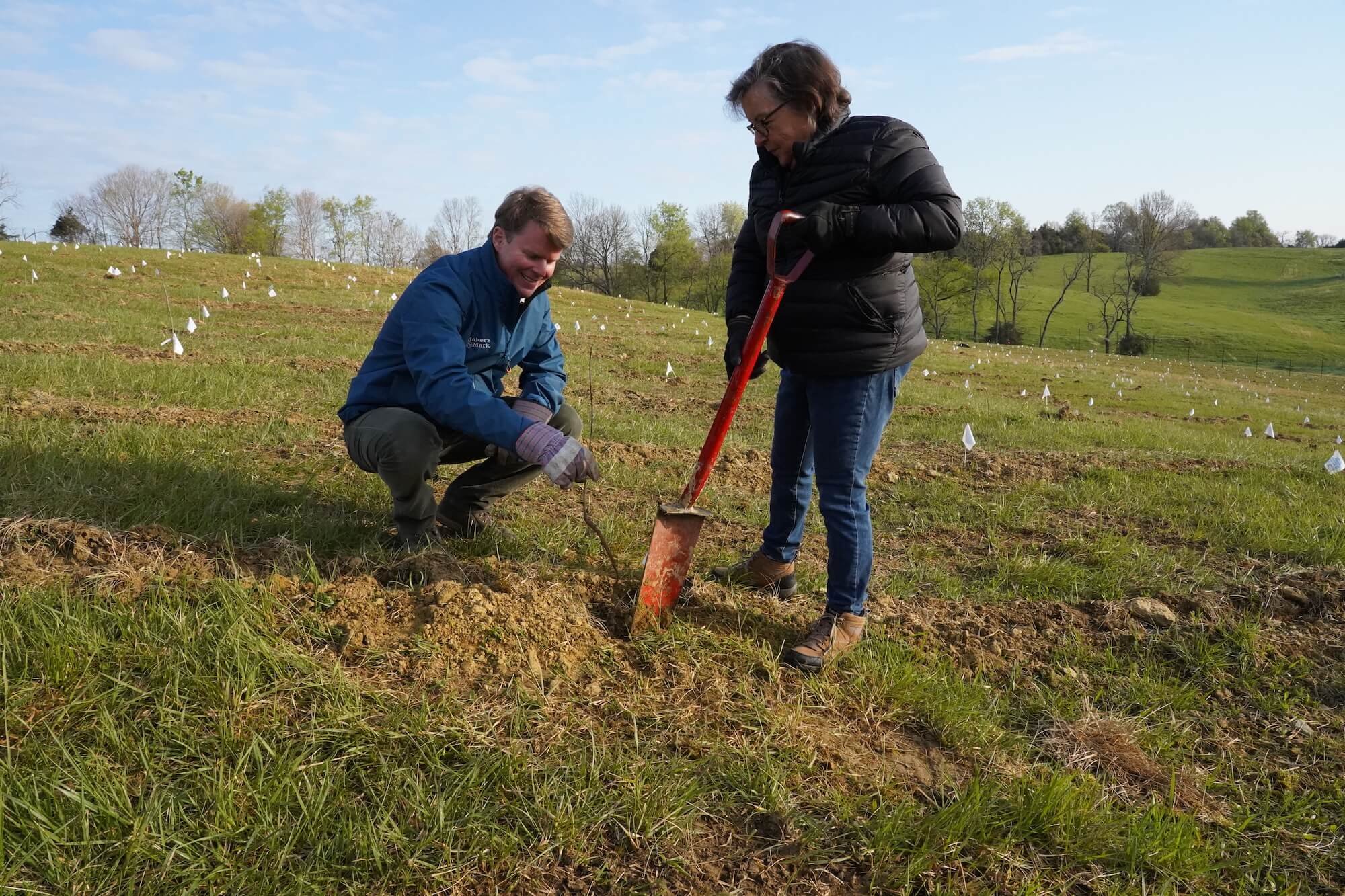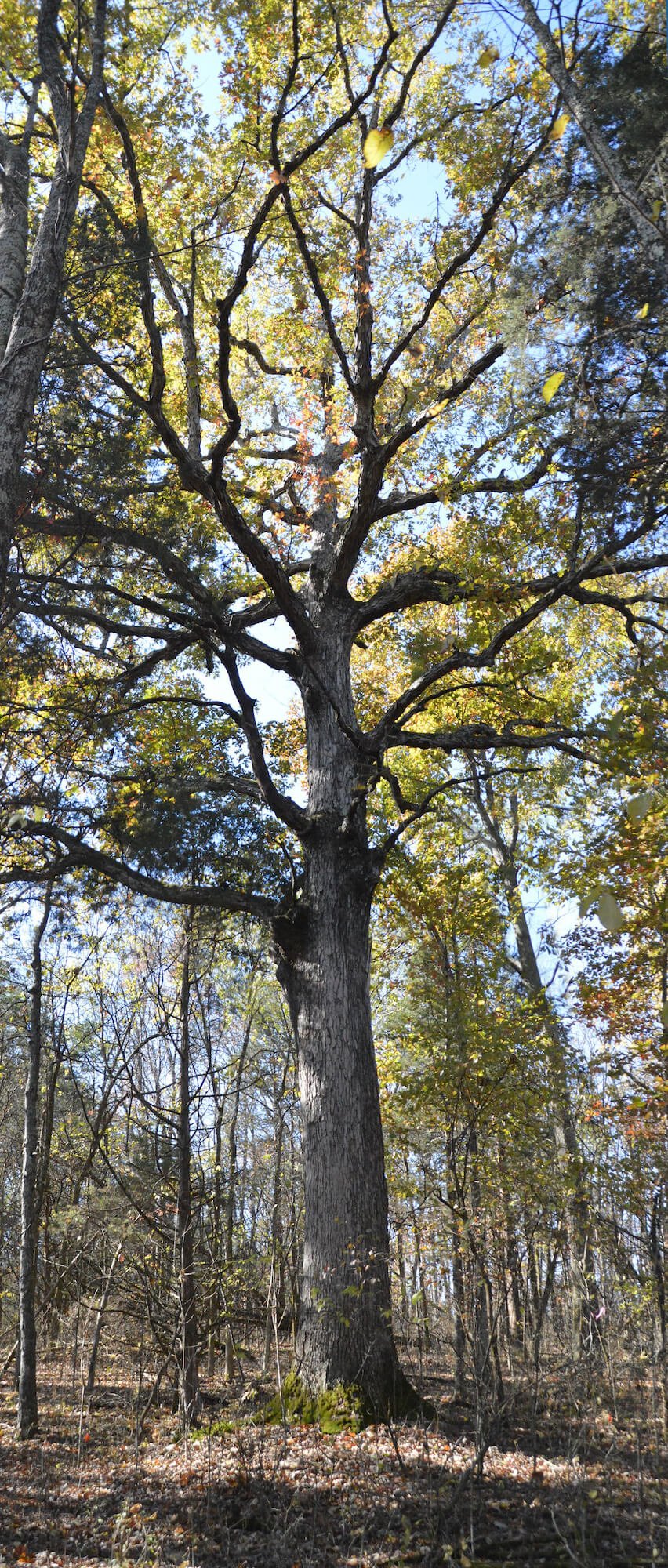At Maker’s Mark Distilling Sustainably is all in Good Taste
The first ever order for Maker’s Mark from a distributor was for just six bottles. But recently, the distillery based in Loretto, Kentucky, became the world’s largest distillery to gain B Corp Certification. This recognizes the innovative sustainability programs that Maker’s Mark implements at Star Hill Farm.
Maker's Rob Samuels and UK Ag Dean Nancy Cox plant oak photo courtesy Maker's Mark
Distillery History
The distillery is a little off the beaten path, and the founders chose the site purposefully. “In 1952, they paid $35,000 for several hundred acres, that would later become the home of their vision,” says Rob Samuels, chief distillery officer, and grandson of the founders. His grandmother, he explains, was the first woman directly connected with a distillery to be inducted into the Kentucky Bourbon Hall of Fame.
The site benefits from having its own water source: a limestone-filtered lake. The limestone helps to filter out iron from the water, making for better tasting bourbon. And when it comes to grain, soft red winter wheat is the star of the Maker’s Mark mash bill. Samuels explains that the distillery is working with a soil scientist and forty different modern wheats. “Regenerative farming is the right thing to do for Mother Nature, but it also, we believe, can be an important part of pushing flavor boundaries,” he says.
The Future of American White Oak
Since all whiskey to be sold as Kentucky straight bourbon must be aged for a minimum of two years in new, charred oak barrels, oak is a vitally important raw material for the bourbon industry, and Samuels is committed to helping ensure a sustainable future for it. Last year, Maker’s Mark and the University of Kentucky announced the establishment of the world’s largest repository of American white oak. This effort will provide a foundation to address current and future threats to white oak trees. The collaboration between the distillery and the university also involves an effort to map the white oak genome, in a study that will uncover information about longevity, disease resistance, and vitality.
Waste Not Want Not
In addition to these longer-term visions, the distillery team is also committed to making incremental changes. Kim Harmon, environmental and safety manager, brings 26 years of experience in the bourbon industry to her role. She is passionate about managing the sustainability goals for the campus including the zero-landfill initiative. There’s some inventive recycling onsite, including the use of a glass pulverizer to convert glass to sand, which is used for the nature trails around the facility. The drive is to push for everything to be reused, Harmon explains. For example, the restaurant has been using the wax that is removed from bottles prior to recycling to make coasters. Plus, the distillery is investing in a new composter whilst working continuously to find new streams for waste. “We have gardens here on campus that feed the restaurant,” Harmon explains. “Then the waste from the restaurant goes to the compost. Then the compost goes back to the garden.”
Grassroots
There is a community aspect to the sustainability efforts, allowing employees to bring their own recycling into the distillery. “It’s cascaded from there. Now they’re bringing in the neighbor’s recycling,” says Harmon. These small steps all add up to making a big difference over time. “I get so exhausted with 10, and 20-, and 30-year plans,” she says, pointing out that as great as these longer-term goals and visions can be, she also likes to focus on what she can do right now. “So, we’re kind of taking those baby steps.”
Harmon says that she is seeing attitudes to sustainability in the industry-changing and that the pace of that change is now picking up. “The consumer has made it known that these are their expectations,” she says. “That’s when the businesses tend to follow.” Samuels agrees. “Customers want to choose a brand with a higher purpose,” he says. The founders of Maker’s Mark likely couldn’t have imagined the challenging circumstances of the climate emergency that the beverage industry faces today, but Samuels is grateful that his family chose the land that they did. Thanks to the plentiful space on suitable land, the Maker’s Mark team can welcome guests and remain diligent stewards of their environment, all whilst distilling great tasting bourbon.




